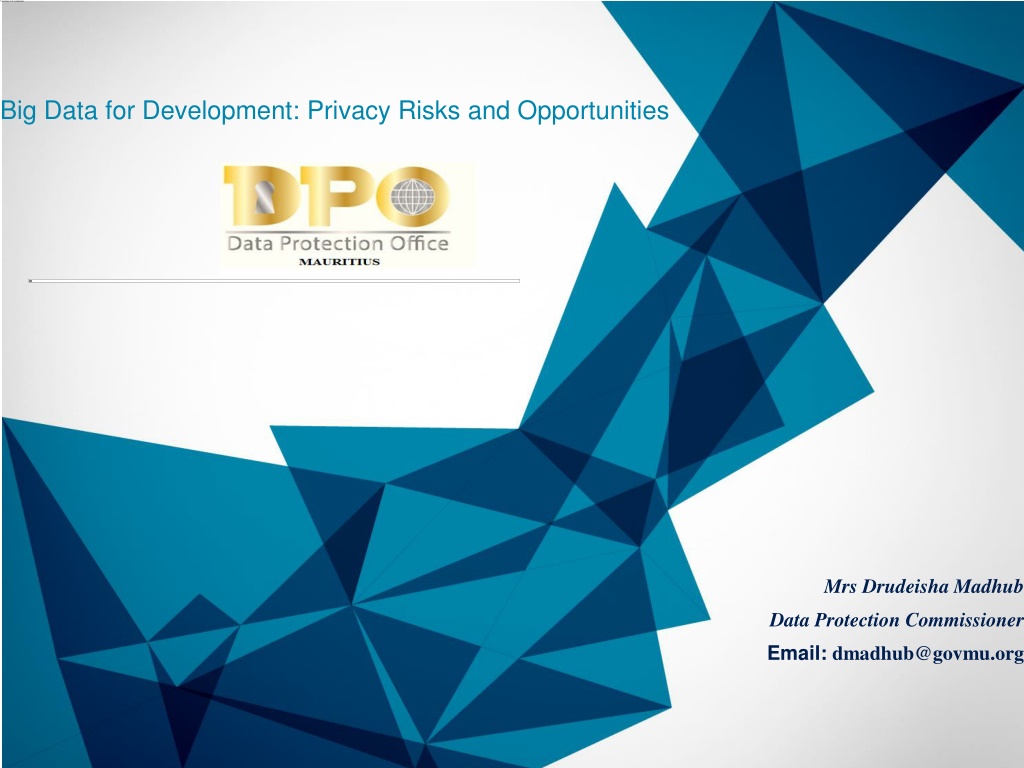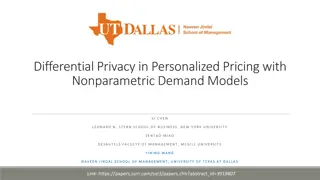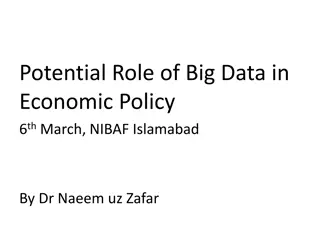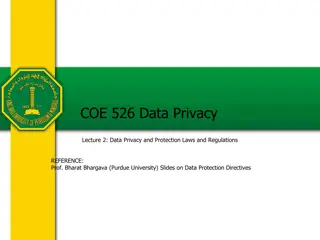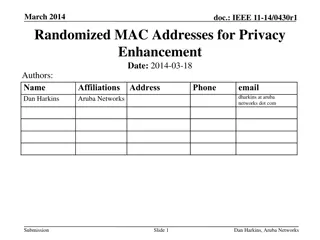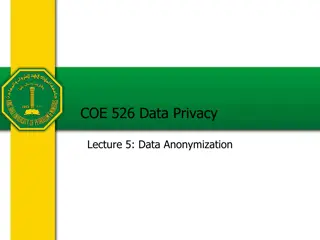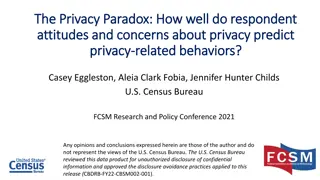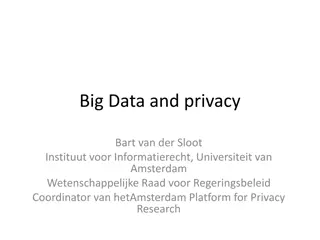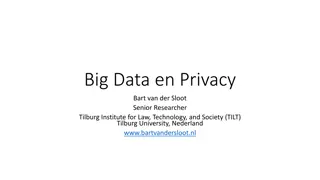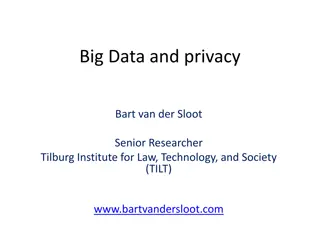Privacy Risks and Opportunities in Big Data for Development
Big data presents both risks and opportunities for development initiatives, with the potential to enhance policy-making processes. While big data can improve the efficiency of public policy and administration, concerns arise regarding data accuracy, inclusivity, and transparency. Upholding privacy principles, ensuring data relevance, and addressing representational biases are essential for responsible big data utilization in policy development.
Download Presentation

Please find below an Image/Link to download the presentation.
The content on the website is provided AS IS for your information and personal use only. It may not be sold, licensed, or shared on other websites without obtaining consent from the author. Download presentation by click this link. If you encounter any issues during the download, it is possible that the publisher has removed the file from their server.
E N D
Presentation Transcript
Big Data for Development: Privacy Risks and Opportunities Mrs Drudeisha Madhub Data Protection Commissioner Email: dmadhub@govmu.org
INTRODUCTION Big data consists mainly of data that is openly available, created and stored. It includes public sector data such as national health statistics, procurement and budgetary information, infrastructure data. While big data may carry benefits for development initiatives, it also carries serious risks, which are often ignored. In pursuit of the promised social benefits that big data may bring, it is critical that fundamental human rights and ethical values are not cast aside. and transport and Data Protection Office - Mauritius - 2
Applied Privacy Principles Purpose specification and limitation: data are to be collected for specified, explicit and legitimate purposes and cannot be further processed in a way incompatible with these. However, in general, further processing for historical, statistical or scientific purposes should not be considered incompatible with the initial purpose. Transparency and concern: individuals are to be informed about the processing of their data, which requires explicit consent that can be withdrawn anytime. Data minimisation: data must be accurate, relevant and not excessive in relation to the purposes for which they are processed. Limited retention: keeping data in a form which permits identification of a person only as long as it is necessary for the purposes for which the data were collected or for which they are further processed. Data Protection Office - Mauritius - 3
Whose data and for what policies and programmes? New technologies are enabling the creation of new forms and high quantities of data that can inform policy-making processes, improving the effectiveness and efficiency of public policy and administration. However, inaccuracies can exist in the data used either because data is not regularly updated, relates only to a sample of the population, or lacks contextual analysis. Data Protection Office - Mauritius - 4
Whose data and for what policies and programmes? A recurring criticism of big data and its use to analyse socio-economic trends for the purpose of developing policies and programmes is the fact that the big data collected does not necessarily represent those towards whom these policies are targeted. The collection of data may itself be exclusionary when it only relates to users of a certain service (health care, social benefits), platforms (i.e. Facebook users, Twitter account holders, etc.) or other grouping (i.e. online shoppers, loyalty card members of airlines, supermarkets, etc.) Data Protection Office - Mauritius - 5
Whose data and for what policies and programmes? In the developing world, only 31 per cent of the population is online, 63 in 100 inhabitants have a mobile phone and 11 per cent have access to mobile-broadband. Ninety per cent of the 1.1 billion households that are not connected to the Internet are located in the developing world. Some countries in Africa have less than 10 percent of their population active on the internet. This means whole populations can be excluded in data-based decision- making processes. Data Protection Office - Mauritius - 6
Dangers of Big Data While access to such data is posited as opening opportunities for development, it also has the potential to seriously threaten the right of individuals to keep their personal information private Data Protection Office - Mauritius - 7
Dangers of Big Data If private sector data falls into the wrong hands, it could enable monitoring of individuals, identification and surveillance. Despite guarantees of anonymisation, the correlation of separate pieces of data can (re)identify an individual and provide information about them that is even more private than the data they consented to share, such as their religion, ethnicity or sexual orientation. If this were to happen in certain contexts the consequences could have tragic impacts, especially if the data concerned relates to vulnerable groups such as minorities or refugees, as well as societal groups including journalists, social dissidents and human rights advocates. Data Protection Office - Mauritius - 8
Dangers of Big Data Big data development initiatives such as that conducted by French telecommunication company, Orange, in C te d Ivoire have shown that even a basic mobile phone traffic data set can enable conclusions about social divisions and segregation on the basis of ethnicity, language, religion or political persuasion. Data Protection Office - Mauritius - 9
Dangers of Big Data Internet users who are the primary producers of data may be unaware that they are producing data; they may also be unaware of what their data is being used for and by whom it is being used. Data is often sold or distributed to third parties without an individual s knowledge of where the data is going and for what purposes it will be used. Data proliferation could pose other even more perverse security risks. Data Protection Office - Mauritius - 10
Opportunity As individuals across the planet connect to the Internet and to mobile networks, creating more and more data, there are opportunities to make new observations and inferences about the world and, one hopes, craft better policy outcomes. There is, however, an absence of legal and technical safeguards for data protection, privacy and accountability, particularly in many developing countries where most of this new connectivity and data production is happening. Relevant policy actors need to soberly assess these risks to privacy and security, and move quickly to fill current governance gaps. Otherwise, as we step forward to embrace big and open data s significant potential to make policy better, we risk undermining opportunities for people in developing countries. Data Protection Office - Mauritius - 11
What must be done? Data is data. Yet the short- and long-term consequences of collecting data in environments where appropriate legal and institutional safeguards are lacking have not been properly explored. Amassing and analysing data always has the potential to enable surveillance, regardless of the well-intentioned objectives that may underpin its collection. Development is not merely about economic prosperity, and social services. It is about providing individuals with a safe environment in which they can live in dignity.. Data Protection Office - Mauritius - 12
Towards accountability Crawford and Schultz, two researchers are challenging the fairness of the process of collection rather than the attempting to regulate it, which would be more complex and contested. They have thus applied these principles to address existing privacy concerns linked to the development and use of big data, namely: Data Protection Office - Mauritius - 13
Towards accountability requiring those who use big data to adjudicate others, to post some form of notice disclosing not only the type of predictions they are attempting, but also the general sources of data that they are drawing upon as inputs, including a means whereby those whose personal data in included can learn of that fact; providing an opportunity for a hearing to challenge fairness of the predictive process; and the establishment of an impartial adjudicator and judicial review to ensure accountability of those who adjudicate others, i.e. those who deprive individuals of a liberty interest do so without unwarranted bias or a direct financial interest in the outcome. Data Protection Office - Mauritius - 14
Data Protection Measures Individual control over what personal data companies collect from them and how they use it. Transparency, or easily understandable and accessible information about privacy and security practices. The collection, use, and disclosure of personal data to be done in ways that are consistent with the context in which consumers provide the data. Security and responsible handling of personal data. Access to their personal data in usable formats, with the power to correct errors. Reasonable limits on the personal data that companies collect and retain. Data Protection Office - Mauritius - 15
Conclusion The use of big data is intrinsically linked to ethical values, which means that the starting point must be the development international guidelines governing access to and analysis of individuals data. Thus as Crawford and Schultz conclude: Before there can be greater social acceptance of big data s role in decision-making, especially within government, it must also appear fair, and have an acceptable degree of predictability, transparency, and rationality. Without these characteristics, we cannot trust big data to be part of governance . Data Protection Office - Mauritius - 16
References https://www.privacyinternational.org/node/225
